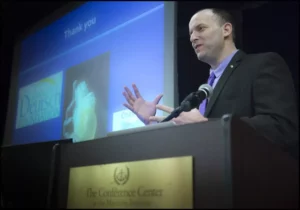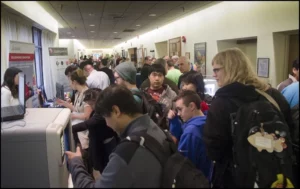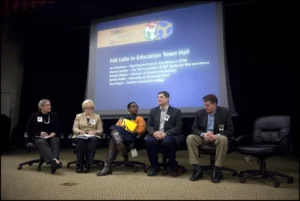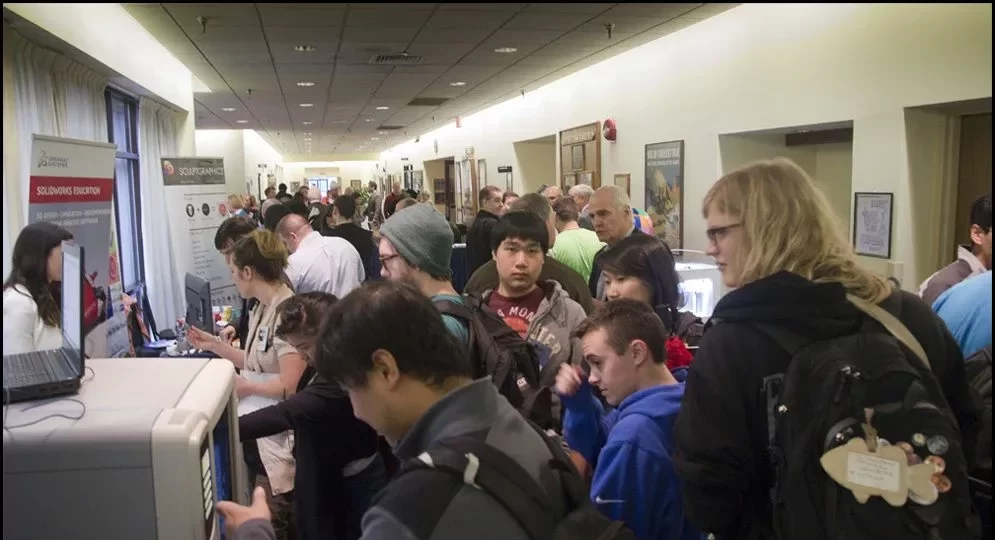
Thanksgiving is a time when we think about giving back to the community in thanks for our own success and good fortune. Recently, Potomac had an opportunity to share our expertise on the powerful use of digital fabrication in diverse fields with attendees at the annual DigiFab Conference in Baltimore.
Partially underwritten by Chevron and the Deutsch Foundation, DigiFabCon highlights the fundamental changes digital fabrication is bringing to manufacturing, K – 16 formal education, startup creation, job training, non-traditional learning, innovation, new business models, community building…in fact, life as we know it.
New Digital Fabrication technologies, especially 3D Printing, are grabbing headlines but what does this all really mean? To help the community understand the complexities of that question, Potomac served as DigiFabCon’s program chair and collected a group of experts from industry and the Fab Lab Network to give real world examples of the power and challenges digital fabrication brings to a wide range of everyday activities.
Opening with welcomes from Ralph Resnick of America Makes and Stephanie Santoso from the White House Office of Science and Technology Policy, 3D Printing was front and center in the 1st keynote from 3D Systems Corporation. Hugh Evans, VP of Corporate Development and Ventures at the company that invented 3D Printing in 1983, gave a clear and concise analysis of the driving factors that allow 3D Printing to impact everything from medical devices such as the Invisalign dental braces and prosthetics that are a fashion statement, to aircraft parts that reduce weight, to candy and chocolate, to industrial rapid prototyping and production applications. The future of manufacturing is here and it can only grow as innovative entrepreneurs explore the potential of new design options.

The Fab Lab Network presented the 2nd Keynote. Sherry Lassiter, Director of the Fab Foundation that coordinates all 400 worldwide fab labs, described the commonalities of all Digital Fabrication Laboratories and then detailed projects from specific labs that were changing the communities in which they are located. Blair Evans, Executive Director of Incite Focus in Detroit, gave examples of how work in their Fab Labs was changing the essential definition of being a “productive member of society”. By giving youth and community members the tools to fabricate everyday needs from food to shelter to toys, the entire social fabric of economic life was altered to increase the time communities have to do the things they love.
David Schneider, a professor of Systems Engineering at Cornell, shared how design projects like the Intel Cup are fabricating a new breed of designers. Michael Raphael, CEO of Direct Dimensions, dazzled the audience with photos of the many objects they had scanned for museums, movie-making, and 3D selfies. And Alex Baddock explained how software from SOLIDWORKS could expand CAD design to fit the complexities of the new 3D world.
The Education Track was organized by the Teaching Institute for Excellence in STEM, a Fab Lab member that organizes FabEd programs and helps bring Fab Labs to educational institutions. The Manufacturing Track was organized by Roger Kilmer of NIST and included inspiring new business models from Kegan Schouwenburg, who is turning the custom insoles industry on its ear with SOLS, and Justin Fishkin who is part of Local Motors’ Crowdsourcing manufacturing of a 3D Printed car and appliances in cooperation with GE. Our own CEO Mike Adelstein explained how Potomac is integrating 3D Printing with other digital fabrication technologies on the factory floor.

Perhaps most captivating were the live demos. Fab Lab Baltimore laser cut and engraved the keepsake badges, ShopBot Tools showed a new personal milling machine, NV Robotics introduced a fully automated 3D Printer, and Sculptgraphics had samples of parts 3D Printed from standard paper on MCor machines.
It was a day of eye-opening ideas, concepts and experiences for everyone who attended, whether new to Digital Fabrication or an experienced professional. If we were able to inspire creativity in just one designer, manufacturer, or educator, then Potomac is grateful during this season of giving thanks.


